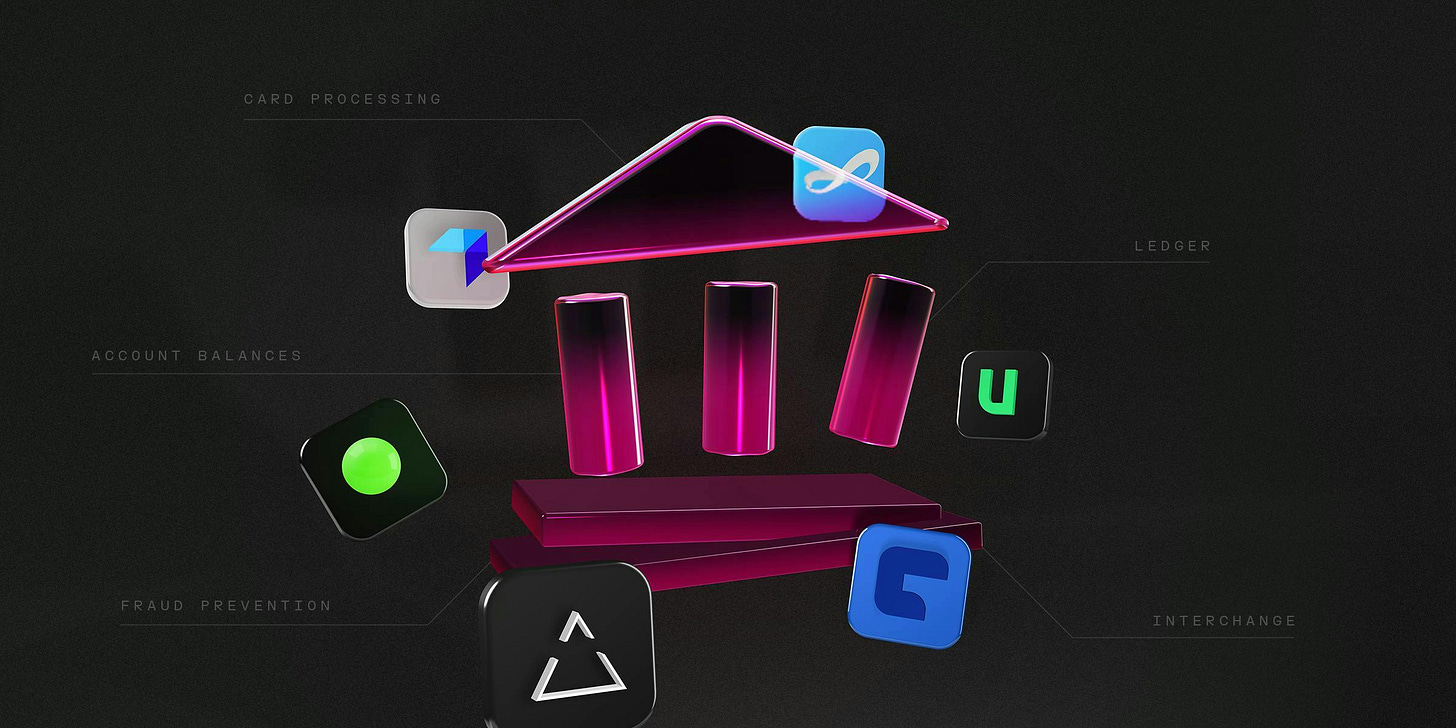Contrary Research Rundown #75
The Great Bank Unbundling, plus new memos on Plaid, Cover, and more
Research Rundown
In our latest deep dive, we unpack the history of fintech and the creation of embedded finance as a category. Fintech has played out in three acts to become what it is today: (1) digitization, (2) disintermediation, and (3) embedded infrastructure.
In Act 1, the focus was on making digital banking possible and mainstream. In Act 2, banking became less centralized and started showing up in disintermediated financial apps. Finally, in Act 3, the emphasis shifted to establishing banking partnerships as infrastructure, which enabled disintermediation at scale. This enabled non-fintech companies to also offer financial services. That was the vision behind Banking-as-a-Service.
As Act 3 of fintech has played out, nearly every successful verticalized software product, from Toast to Shopify, has attempted to embed financial services into its core product offerings. For example, 83% of Toast’s 2021 revenue came from financial services alone.
As more technology platforms started looking for ways to expand their revenue streams by broadening their financial service product offerings, many community banks (e.g. banks with less than $10 billion in assets) continued to see contracting revenue. Historically, community banks have used their physical footprint in specific geographies to compete against larger banks. But in a digital world, a physical branch can be a diminishing asset.
Direct partnerships with software companies presented these community banks with a more cost-effective distribution channel than competing directly with larger banks. These software companies already had a captive audience of users interested in financial services and community banks had already been offering these financial products for decades.
What followed was the creation of banking-as-a-service, and a rapidly changing environment of technical infrastructure, banking regulation, and question marks about the future of embedded finance.
Here’s the link to read our full deep dive, The Great Bank Unbundling.
Sardine is a company that helps crypto platforms prevent fraud, increase authorization rates, and remain compliant with respective crypto on-ramp requirements, NFT checkout, and fraud & compliance products. To learn more, read our full memo here.
Machine Learning Engineer - Canada/USA Remote
Software Engineer (Frontend) - Latin America/Brazil/Argentina - Remote
Cover is a modular home builder that designs, manufactures, and installs backyard homes in Los Angeles. To learn more, read our full memo here and check out some open roles below:
Engineering R&D Technician - Gardena, CA
Supply Chain Engineer - Gardena, CA
Plaid is well-positioned to benefit from the growth of embedded finance. It has built a widely-used abstraction layer that provides integration between financial applications, banks, and other financial service providers. To learn more, read our full memo here.
Experienced Product Designer - Dashboards - USA Remote
Experienced Product Manager - Product Platform - USA Remote
Check out some standout roles from this week.
Ramp | NY Remote, NY - Software Engineer | Backend, UX Researcher, Product Operations Specialist | Generalist
Warp | Remote US and Canada - Software Engineer
Adonis | NYC - Senior Platform Engineer, Senior Full Stack Engineer, Software Engineer (DevOps), Machine Learning Engineer
Thatch | Remote - Software Engineer, Designer, Product Manager
Last week, we touched on Reddit’s IPO. As a follow up to that, check out OnlyCFO’s breakdown of the business fundamentals.
One of the big announcement around Reddit a few weeks ago was the announcement that the company was selling data to Google for AI training. In similar news, StackOverflow has also signed a deal to sell data to Google for AI training.
More and more, companies are looking for opportunities to ink deals with AI companies for their data. Auttomatic, the company that owns Tumblr, has signed such a deal with Midjourney and OpenAI to train models on their data.
Gartner predicts search volumes will decrease by 25% by 2026 due to “AI chatbots and other virtual agents.” We’ve already seen similar trends with plummeting StackOverflow traffic, for example.
On the other side of the coin, product feedback marketplace, G2, reported search traffic for the top five AI software categories has “continuously decreased month over month from August 2023 to January 2024.” Those categories included AI writing assistants, chatbots, text-to-speech tools, image recognition software and intelligent virtual assistants, with AI writing companions seeing the steepest drop off of 81% in the time frame.
Klarna shared that its AI assistant, powered by OpenAI, can handle ~65% of open requests, replacing the work of 700 agents. Performance claims like this continue to support the claim that ~80% of rote work done by knowledge workers can be replaced by AI.
Stripe has put together a $1 billion employee share-sale deal, enabling employees to get liquidity. The transaction gave the company a slight rise in valuation, at $65 billion.
Some government officials are claiming Elon Musk’s’ SpaceX is withholding internet access from US troops in Taiwan, potentially in breach of contract. For more on SpaceX on Starlink, check out our memo.
It’s been a very “Elon Musk-y” week, with two other pieces of news revolving around his companies. First, a former Boring Company employee claimed that working conditions at the company made them fear for their lives.
Second, Elon Musk has filed a lawsuit against Sam Altman and OpenAI for “betraying” the company’s initial non-profit mission. In part, the lawsuit leans on research from Microsoft AI, which referred to OpenAI’s newer products as having “sparks” of A.G.I.
After burning $10 billion over 10 years on the project, Apple announced it was shutting down its autonomous car project. The project had experienced a significant amount of executive turnover, and vision shift, from an electric car to an autonomous vehicle.











Excellent edition!